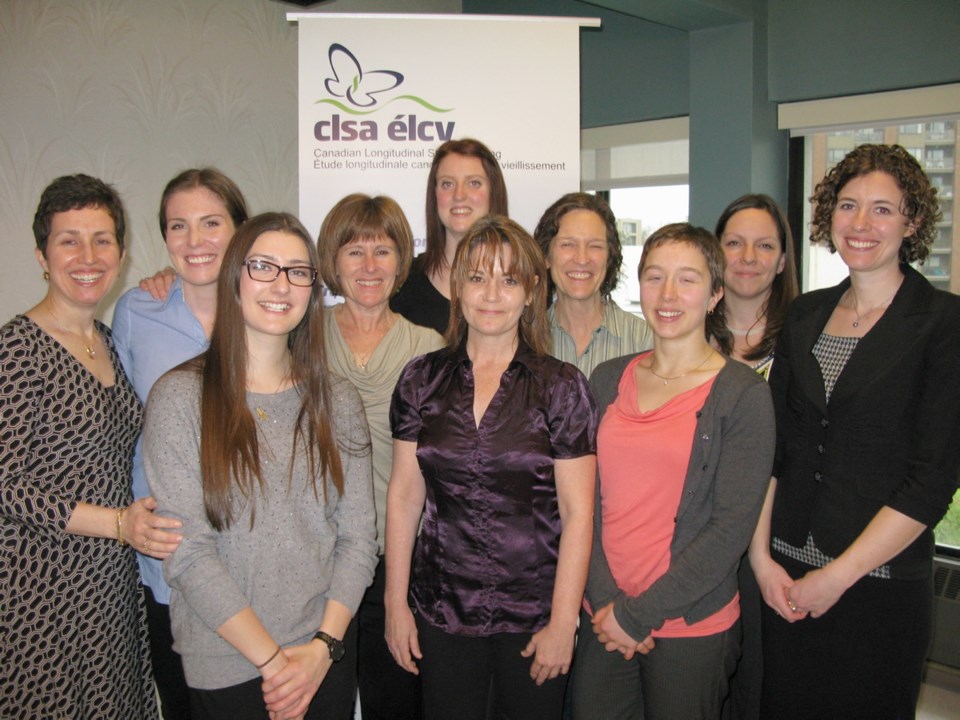‘She gave me one minute to list all the words I could think of that start with F,” she says. “The only words I could think of were four-letter words, and I couldn’t possibly say those.”
My friend is taking part in the Canadian Longitudinal Study on Aging, a national, long-term study that collects information on the changing biological, medical, psychological, social and economic aspects of people’s lives in order to understand how these factors affect health, disease and disability in aging. She took the first series of assessments a year or so ago, when the study launched.
The test she describes measures verbal fluency, mental organization and short-term memory.
“I was so focused on not saying those words, I could hardly think of any others,” she says. “I was so relieved when that minute was up. … But then she told me to list all the words I could think of that start with A. I’m afraid that wasn’t much of an improvement.”
My friend grew up at a time when well-brought-up young women didn’t leave the house without hats, hankies, gloves, crinolines and clutch purses. Decades later, she still won’t go out without first doing her hair and makeup and changing her outfit. (“What if I meet somebody?” she says, aghast. “Who would even notice? Or care?” I answer. She remains unconvinced — possibly rightly.)
The Canadian Longitudinal Study on Aging follows about 50,000 Canadians for 20 years; all were 45 to 85 years old at the start of the study. All 50,000 participants provided demographic, lifestyle, behavioural, social, psychological, socio-economic and health information at the start.
Of these, 30,000 participants share information about their diet, medication use, chronic diseases and sleep patterns. They also have measurements and blood and urine samples taken at local data-collection sites, including at the University of Victoria. The study follows up with participants every three years.
“Then she asked me to list all the words I could think of that start with S. Well, I just started laughing,” she laughs, then suddenly stops. “I’m afraid I didn’t do very well. What must they think of me?”
Those who take the word test tend to perform according to their age and their education. For example, people in their 40s typically outperform all other age groups by listing, on average, 44 words. People in their 50s list 42 words. Those in their 60s list 38.5 words. With each decade after the 40s, participants list a few words fewer. These word counts are averages, not absolutes, so individual variation exists.
My friend scored just 27 words, compared with the 35 words typical for the 70-79 age group.
“I was trying to be a lady, and I performed worse than somebody two decades older.”
She was running up against a couple of psychological phenomena. The ironic-process theory describes how deliberate attempts to suppress specific thoughts make them more prominent. It’s also called the white-bear problem, for a line in Russian writer Fyodor Dostoevsky’s essay Winter Notes on Summer Impressions: “Try to pose for yourself this task: not to think of a polar bear, and you will see that the cursed thing will come to mind every minute.”
The limited-capacity hypothesis builds on the ironic-process theory. It suggests a person’s ability to process information is limited overall, and ability to perform simultaneous tasks depends on how much cognitive capacity the jobs require.
In my friend’s case, desperately suppressing potty mouth took up much of her capacity, with little random-access memory leftover to think of other words that met both the test’s and her own requirements. The stress of being in a testing situation for the first time in decades, and her desire to perform “appropriately” as well as “well” likely didn’t help.
“They were testing how your brain works, not your manners,” I said. “If you’d just said the words, instead of trying to censor them, you would have got them over with and out of your head, then been able to move on to others. And you would have scored points for those words.”
“You’re probably right, but what would they have thought of me then?”



